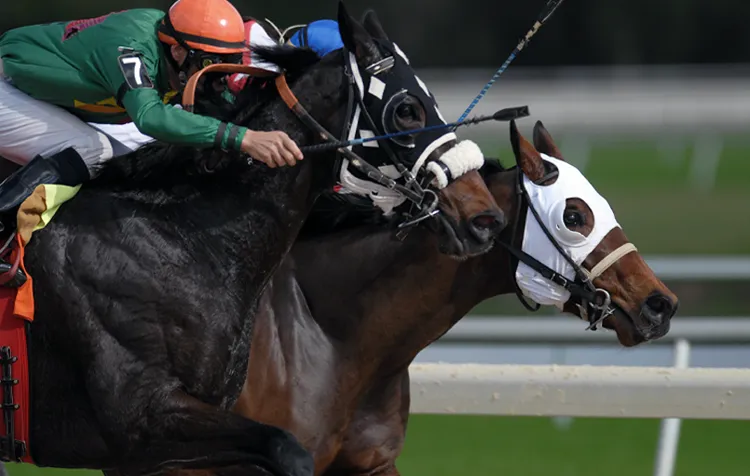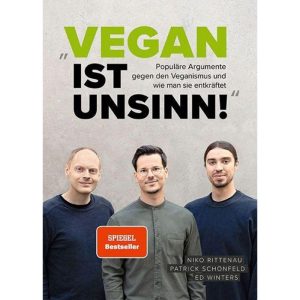Are horse races cruelty to animals and no longer in keeping with the times? If you're looking for a clear answer to this question, you've come to the right place. Horse racing has a long tradition and is one of the oldest sports in the world. Especially the atmosphere at the racetrack and the adrenaline of betting on the fastest horse, let millions of people follow the sport with excitement.
But the frequent injuries and deaths, as well as many other backgrounds of the sport, raise serious questions about the welfare of racehorses. Are horse races torturous for the animals and is it morally acceptable to provide our entertainment on the backs of horses?
In this article I would like to take a closer look at the world of horse racing - from the motives and attractions to the ugly downsides. You will learn why horse racing cruelty to animals and whether the sport is still up to date. I'll also show you exactly what you can do to help the animals. Let's go!
Here you can find a short overview in advance:
Definition: What are horse races anyway?
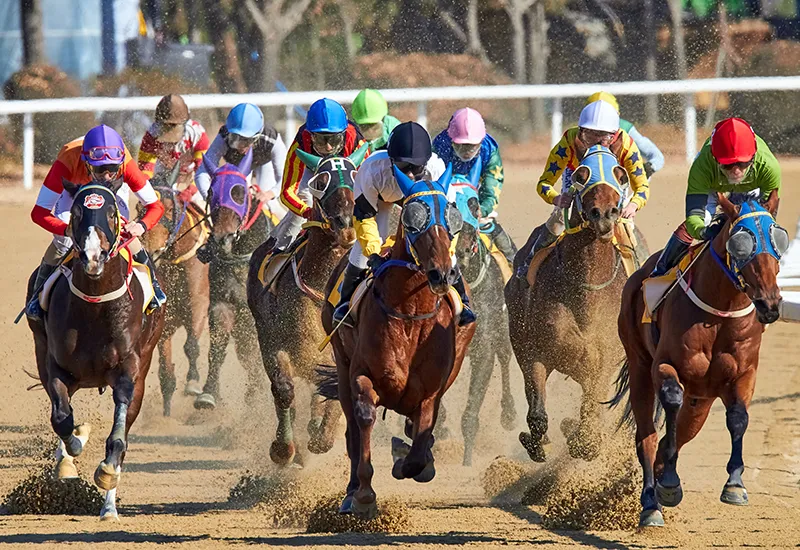
Horse racing is a Sport in which horses and their jockeys are (Professional race rider:inside) compete against each other in speed contests.
The race on horses is one of the oldest known sporting events and tells a millennia of history, which dates back to ancient times. Probably the most famous and prestigious event of the sport is the Gallop race, in which the horses have to run as fast as possible over a certain distance.
What breed of horse is used for gallop racing?
In horse racing, preference is given to the English thoroughbred set. This breed is known for its speed and endurance. For centuries, it has been bred specifically for racing according to clear performance characteristics. Horses were thus systematically selected and trained by us humans to become so-called "racehorses".
What exactly attracts people to horse racing?
To create a gain a clear picture of the sport, it is important to understand the benefits and appeal of horse racing. So what attracts people to the TV and the stands of the world's racecourses?
Here I have clearly summarized the most important reasons:
- Economic benefit: The global market for horse racing is huge. According to studies by economic researchers, it is worth 402.3 billion U.S. dollars.₁ This means that the traditional sport promotes the economy and creates jobs - for example in the areas of breeding, training, betting and media.
- Sports competition: Another attraction of horse racing is that it is a demanding sport that requires skill, courage and strategic thinking to succeed. And this is true both on the part of the jockeys and on the part of the trainers.
- Pleasure: Betting on a particular horse, and not least the unexpected money win, generates euphoric feelings in many people. Above all, the excitement and the opportunity for positive experiences excite the bettors. For many fans of horse racing, however, the atmosphere at a race, the sense of community, the splendor of the horses, as well as the roar of the crowd, also provide enthusiasm.
- Cultural significance: Horse racing has a deep history in many cultures around the world and has been held regularly for centuries. For example, in England - the passionate horseman Charles II, King of England, is considered the founder of gallop racing.
8 reasons: Why are horse races animal cruelty?
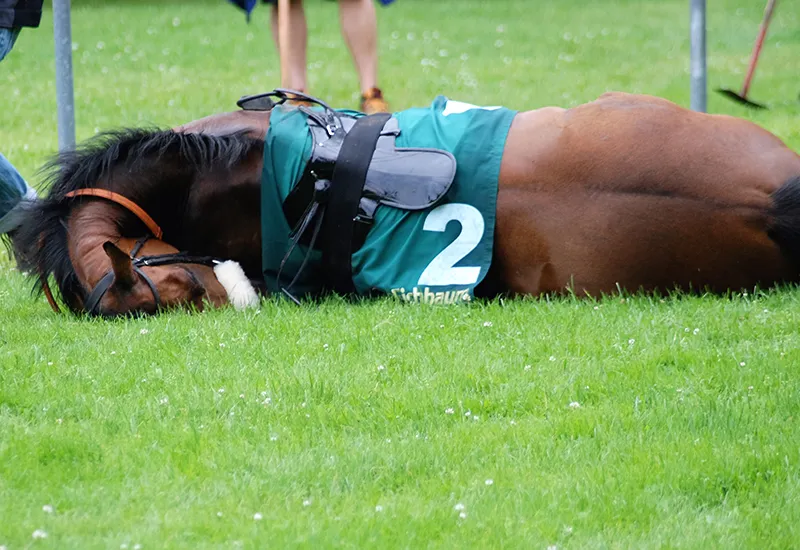
Now that we have learned about the initial fascination and appeal of horse racing at the latest, we can turn our attention to the other side of the coin. It is a side that unfortunately in the shadow of the racing spectacle and in many cases is not used by spectators. often unnoticed remains - even if it often ends with the death of the animals.
Here I present you now essential Accusations, criticisms and arguments against horse or gallop races. They emphasize that horse racing is cruelty to animals and why we absolutely must talk about it.
1. race horses suffer overly harsh whip lashes
The whip serves the jockeys, among other things, as a tool to keep the track and to motivate the horse. However, it is often used too harshly and excessively. Even if the use of the whip is therefore subject to strong regulations and controls by the tournament judges - and may occur, for example, only 5x per race - whip lashes are a extremely controversial practice in horse racing.
The Swedish racing authority "Svensk Galopp" has the use of the whip even totally forbidden. There it may only be carried to avert dangerous situations.₂ Understandable, because it is not only morally reprehensible, but also incompatible with the Animal Welfare Act, as it is a cruelty to animals which inflicts pain and extreme stress on the horse for no reasonable reason.
2. race horses receive doping drugs
"Big Racket" (English Thoroughbred) is the fastest racehorse in the world to date. In the year 1945 it was born with a Speed of 69.62 km/h measured. By way of comparison, warm-blooded horses achieve an average speed of around 36 km/h in a racing gallop.₃
In order for racehorses to reach such "supernatural" speeds and endure the stress of the race, they are often given Short-term performance-enhancing drugs (e.g. scopolamine) are administered. Apart from the fact that doping is a violation of fair, sporting competition and is therefore prohibited, the drugs often lead to long-term damage to health.
Tip: Why is animal welfare actually so important? In the linked article I have dealt intensively with the answer to this question. Feel free to have a look!
3. racehorses have to perform already at the age of development
Horses are still in the physical growth phase until about the age of seven. But in order for them to become a valuable, successful racehorse, they are often already with two or three years to the start of the tournaments skill and trained hard for it at a young age.
The training and the means used are brutal. For example, the animals are Soap stockings (or tongue ties) tied around their tongues so they don't put them over their dentures during the run and choke on them. And the Strap on the head is used for fixation and is intended to help horses keep their balance.
These unnatural aids and measures in horse racing not only cause stress for the animal - they can also lead, among other things, to permanent damage and a higher susceptibility to injury lead.
4. racehorses have anxiety, stress and show behavioral disorders.
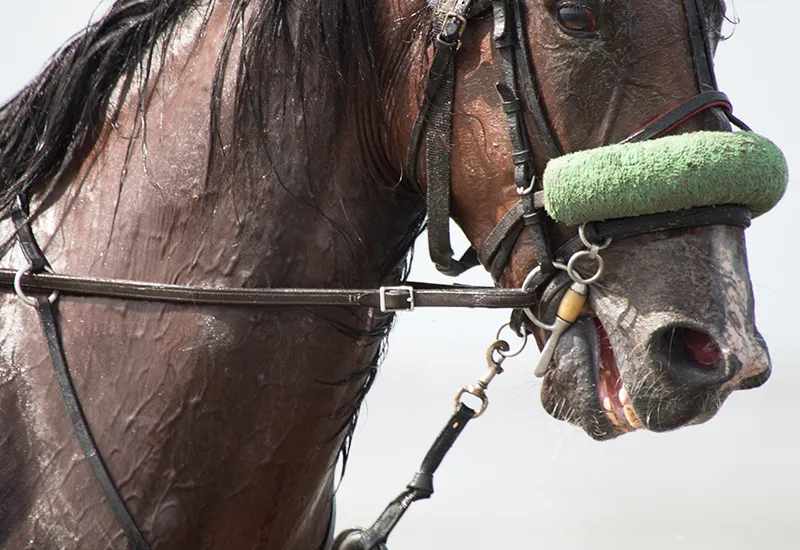
Imagine being pushed into fight mode by a third party in the start boxso that you run as fast as possible. Meanwhile, your tongue is tied and you can only see straight ahead through the blinkers. After the loud starting gun, you will be forced to take extreme risks that you would never take voluntarily. And if you don't, you'll get lashes with the whip. An excruciating and stressful idea, don't you think? However, this is exactly the situation that is absolutely normal for the animals in horse racing.
Racehorses are also sentient beings, like you and me. You unfortunately under Anxiety, overwhelm, panic attacks and jumpiness.₄ and are often already wet with sweat before the race. Since the animals have to endure considerable, psychological stress for the entertainment and pleasure of humans, this is clearly animal cruelty.
Good to know: Behavioral disorders are also not surprising in racehorses because they are often kept and trained in controlled environments with limited opportunities for social interactions with their peers.
5. race horses suffer serious injuries or die in the race.
Away from the long-term agony, the animals are only a hoofbeat away from death during the race. Racehorses are forced by us humans to perform at their best - and thus also to take life-threatening risks. Bone fractures, tendon injuries, Aortic ruptures or Neck fractures are not uncommon. Serious falls often still mean death on the racetrack.
Here are some Scandals and examples from the gallop racing sportwhich underline that horse racing is cruelty to animals and often ends with dead horses:
- Letro: The gelding dies at the Mannheim racecourse after an aortic rupture
- Seven dead horses: Mysterious racing scandal at prestigious Kentucky Derby
- Shakar: Horse dies suddenly during gallop race on the Neue Bult in Hanover
- Hill Sixteen: Horse put down after breaking neck during Grand National
The death of the horses is accepted by organizers for their personal advantage. The course at the Grand National (the most famous and highest-paying horse steeplechase in the United Kingdom) is so difficult that almost all horses have never made it to the finish line in one piece since the race was first held in 1836. Also because of the course, many horses get out of step or collapse from exhaustion.
6. race horses suffer from serious or fatal diseases.
However, it's not just the events and races themselves that are a pain. The Overbreeding, training and all other, physical and mental stresses on the animals increase the likelihood of serious injury and fatal disease. Colic, stomach ulcers or Bleeding from the lungs are not uncommon.
7. race horses are considered as valuables and trophies
For most people, horse racing is all about Prestige, prize money and entertainment. Racehorses are rather regarded as commodities, trophies or valuable objects to bet and bid on - and not as sentient living beings. Instead of the horse's long-term health and happiness, breeding suitability, resistance, potential and performance play a decisive role, as these characteristics make the animal more valuable to humans.
There is little room for actual love of animals in this royal blood sport. For the animals are "treated well" (health checks, good food, fresh water, etc.) mainly because the more money for their owners and the organizers of the tournaments. This also leads to the fact that the boundaries between sport and animal cruelty are extremely blurred.
8. racehorses often meet a brutal fate after the racing career
The fact that the personal greed for profit of the owners exceeds their desire for the welfare of the animals becomes apparent at the latest when the racehorses are no longer fast enough for a variety of reasons and their "Lose "benefit.
While some are allowed to live on as breeding, riding or pleasure horses, thousands of their peers end up in Slaughterhouses.₅ For the latter option, for example, extra contracts were concluded in the United Kingdom between slaughterhouses and organizers:inside large horse races. It also emerged that even horsemeat could be used for this purpose. Burgers and kebabs processed was.₆
But it is not morality, but rather the bad presswhich has led to the fact that this is now prohibited locally. Instead, dead racehorses are now exported to countries where animal welfare laws are even looser.
3 tips: What can I do against animal cruelty in equestrian sports?

It should now be clear that horse racing is cruelty to animals. After we have illuminated the critical aspects of horse racing, the following questions now arise:
- What can we as consumers do to improve this situation and the lives of racehorses?
- Can you call yourself an animal lover:in and at the same time work in horse racing, keep race horses or watch and support horse racing?
Fortunately, there are many things that each and every one of us can implement to reduce the Help animals. Here I present you now my suggestions and tips to finally end the cruelty to animals at gallop races.
1. no longer watch horse racing
Those who want to end animal cruelty at horse races should stop watching - or betting on - the events on TV or live at the track. The Billion-dollar sport thrives on its popularity and financial profitability and depends heavily on audience demand. By more and more people opting for it, no longer watch, the demand decreases. This also minimizes the suffering of horses for our entertainment.
With the wonderful animal one can step also otherwise and far more animal-friendly into contact. Be it at private Rides or about the activity in the Horse rescue.
Tip: In order to help all animals - as good as practically feasible in everyday life - I live vegan. Which motives are exactly behind it, you can read in the article about my personal reasons for the vegan lifestyle.
2. provide educational work
Inform yourself and other people about the suffering of horses in racing. For example in everyday conversations, in the social media, by Online petitions launched, by supporting political measures or by participating in demonstrations.
Many people are not aware of the negative side of horse racing. Through your educational work, you can actively contribute to making the Awareness of the cruel background of horse racing is growing in our society - and acceptance for traditional equestrian sports is declining.
3. support animal welfare organizations
From German Animal Welfare Association up to PETA - there are many animal welfare organizationswho actively fight against cruelty to animals in horse racing every day. By supporting their work financially or even actively, you can significantly accelerate the development for the protection of horses.
Another spontaneous tip: If you have the means, the time and the desire, adopting or sponsoring a retired racehorse could also be a great solution for you and the animal.
Horse racing is definitely animal cruelty and therefore out of date
Horse racing has a long tradition - but traditions are not automatically and forever morally defensible. The sport is all about entertainment, prestige and power - and not about the will of the animals. Dying is factored in.
"Animals suffer as much as we do. True humanity does not allow us to impose such sufferings on them. It is our duty to make the whole world recognize it."
Albert Schweitzer (more at Animal welfare quotes)
Today you have learned many backgrounds of the sport and arguments against horse racing. Now you can decide for yourself if you want to continue supporting these events or not. In any case, you have the opportunity to stop the exploitation and improve the lives of the so-called racehorses - now and in the future.
Do you have questions, suggestions or your own experiences with horse racing that you would like to share? Are horse races animal cruelty and do you also think they are out of date? Either way, I look forward to your comment - you bet!
Be always kind to animals,

PS: To bring your values even more in line with your actions, I would like to invite you to consider possible Prejudices against the vegan lifestyle to discard. In the linked article, I now debunk the most common misconceptions and clichés. Have fun!
References:
₁ Zion Market Research: Global Horse Racing Market Is Expected to Reach USD 793.9 Billion By 2030 (as of 03/31/2023), available at https://www.zionmarketresearch.com/news/global-horse-racing-market. [26.06.2023].
₂ VeganNews: Sweden bans whip use at horse races, available at https://vegan-news.de/schweden-verbietet-peitscheneinsatz-bei-pferderennen. [26.06.2023].
₃ D. Siegel: Highest, Fastest, Farthest - Horse Records, available at https://www.pa-do.de/blog/tag/schnellstes-pferd-der-welt. [26.06.2023].
₄ saarnews UG: PETA - Criticism of whip use at horse races in Saarbrücken (as of 13.10.2016), available at https://www.saarnews.com/peta-kritik-am-peitscheneinsatz-bei-pferderennen-in-saarbruecken. [26.06.2023].
₅ BBC News: Horse racing - Thousands of racehorses killed in slaughterhouses (as of 19.07.2021), available at https://www.bbc.com/news/uk-57881979 [26.06.2023].
₆ C. Mullin: Horsemeat scandal abattoir took fallen racehorse carcasses from Grand National racecourse (as of Mar. 01, 2013), available at https://www.birminghammail.co.uk/news/uk-news/horsemeat-scandal-abattoir-took-fallen-1317643 [Jun. 26, 2023].

